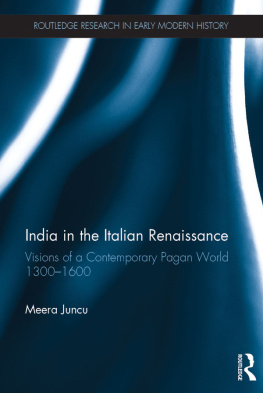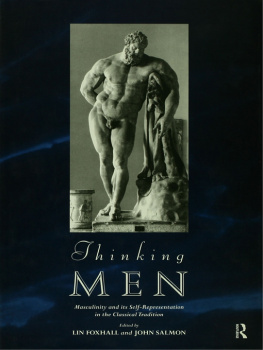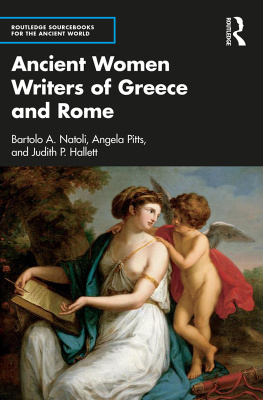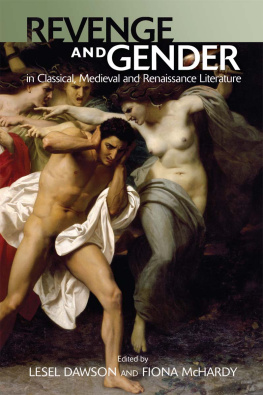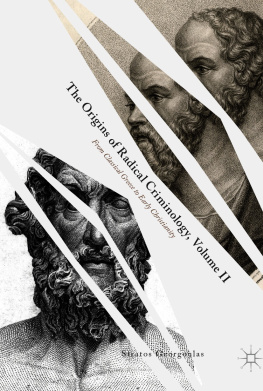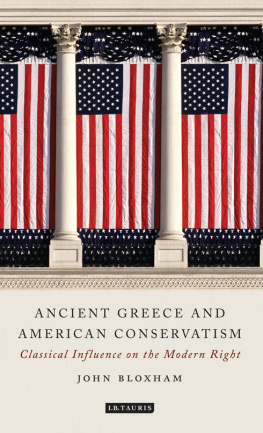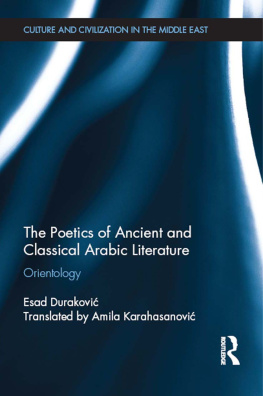Italy and the Classical Tradition
ITALY AND THE
CLASSICAL
TRADITION
Language, Thought and
Poetry 1300-1600
Edited by
Carlo Caruso & Andrew Laird

Bloomsbury Academic
An imprint of Bloomsbury Publishing Plc
50 Bedford Square | 1385 Broadway |
London | New York |
WC1B 3DP | NY 10018 |
UK | USA |
www.bloomsbury.com
First published in 2009 by Gerald Duckworth & Co. Ltd.
Reprinted by Bloomsbury Academic 2013
Preface, Introduction, Subject Bibliography and editorial arrangement
Carlo Caruso and Andrew Laird 2009
Carlo Caruso and Andrew Laird have asserted their right under
the Copyright, Designs and Patents Act, 1988, to be
identified as Authors of this work.
All rights reserved. No part of this publication may be reproduced or
transmitted in any form or by any means, electronic or mechanical,
including photocopying, recording, or any information storage or
retrieval system, without prior permission in
writing from the publishers.
No responsibility for loss caused to any individual or organization acting
on or refraining from action as a result of the material in this
publication can be accepted by Bloomsbury or the author.
British Library Cataloguing-in-Publication Data
A catalogue record for this book is available from the British Library.
eISBN-13: 978-1-4725-2138-5
Library of Congress Cataloging-in-Publication Data
A catalog record for this book is available from the Library of Congress.
Contents
Carlo Caruso and Andrew Laird
Giulio Lepschy
Philip Burton
Nigel Wilson
Martin McLaughlin
Letizia Panizza
Jill Kraye
Claudia Villa
Jonathan Usher
Stefano Carrai
George Hugo Tucker
Preface and Acknowledgements
Studies of classical influences in Italian culture are frequently concerned with Greek and Roman themes in art and literature. However, much less attention is given to the actual role of the Greek and Latin languages and classical texts in Renaissance poetry and humanism: how the languages were mastered and used, and how the texts were understood and appropriated. These questions are central to the present volume which seeks to demonstrate the importance of Italys unique legacy of antiquity for the history of ideas and philology, as well as for literary history. The essays assembled here are all concerned with developments from the fourteenth to the sixteenth century, except for Philip Burtons treatment of rhetoricians and grammarians responses to non-standard Latin in antiquity, which provide an important antecedent to the Renaissance debates about Latinity and the status of the vernacular addressed in the other chapters.
The collection as a whole aims to stimulate fresh approaches rather than to offer the broader or more balanced coverage offered by existing companions to the classical tradition. Nonetheless, the overview in our Introduction should help contextualize the discussions to follow, and an orientation is provided by the further reading in the Subject Bibliography at the end of this book. Authors and editors of the works actually cited in the chapters are included in the General Index.
This publication grew out a lecture series and conference entitled Italy and the Classical Tradition An Uninterrupted Dialogue. These events were hosted by the Departments of Classics and Italian at the University of Warwick in April-May 2005. It is a pleasure to acknowledge the generous support of the British Academy and the Warwick Humanities Research Centre and Fortieth Anniversary Fund, as well as the assistance of Ann Hallamore Caesar, Simon Swain, and Loredana Polezzi in the early stages of this project. Most of the lectures and papers first presented at Warwick were revised or partly re-written for this volume, but it is appropriate to record the original participation of those whose contributions could not be published here: Nicholas Barker of the British Library gave a lecture on Greek scribes in Italy and the first books printed in Greek type; Craig Kallendorf of Texas A&M University explored connections between Virgil, Filelfo and Foucault; and Roberto Tissoni of the University of Genoa examined the classicism of Giacomo Leopardi.
We are extremely grateful to Deborah Blake, the Editorial Director at Duckworth, for her tireless help at every stage of producing this publication; to Theresa Oliver for translating the chapters by Claudia Villa and Stefano Carrai; and to the School of Modern Languages and Cultures of Durham University for subsidizing the translation work. For their readiness to respond to a number of our academic queries we would like to thank Annalisa Cipollone, Stefano Cracolici, Carlotta Dionisotti, Simon Gilson, Tom Harrison, Jonathan Powell, Maude Vanhaelen, and Roger Wright.
Siena and London
May 2009 | C.C., A.L. |
List of Contributors
Philip Burton is Lecturer in Biblical Studies at the University of Birmingham. He is the author of Language in the Confessions of Augustine (Oxford: Oxford University Press, 2007).
Stefano Carrai is Professor of Italian Literature at the University of Siena. He has edited early Italian and neo-Latin texts and is the author of several monographs, including Dante elegiaco. Una chiave di lettura per la Vita nova (Florence: Olschki, 2006).
Carlo Caruso is Professor of Italian at the University of Durham. His main interests are in the field of the classical tradition in Italian literature. He is editor (with A. Cipollone) of Petrarca e Boccaccio. Modelli letterari fra Medioevo e Umanesimo (Alessandria: Edizioni dellOrso, 2005).
Jill Kraye is Librarian and Professor in the History of Renaissance Philosophy, Warburg Institute, London. She is the author of Classical Traditions in Renaissance Philosophy (Aldershot: Ashgate, 2002).
Andrew Laird is Professor of Classical Literature at the University of Warwick. He is the author of Powers of Expression, Expressions of Power (Oxford: Oxford University Press, 1999) and The Epic of America (London: Duckworth, 2006).
Giulio Lepschy, FBA, is Professor Emeritus of Italian at University College London. He is the editor of the four-volume History of Linguistics (London and New York: Longman, 1994-8).
Martin McLaughlin is Serena Professor of Italian and Fellow of Magdalen College, Oxford. He is the author of Literary Imitation in the Italian Renaissance (Oxford: Oxford University Press, 1995).
Letizia Panizza is Honorary Research Fellow at the University of London Royal Holloway. She has published extensively on Italian Renaissance topics, notably on humanist thought (Petrarch, Lorenzo Valla, Pico della Mirandola and, outside Italy, Erasmus) and on women writers.
George Hugo Tucker is Professor of French Studies at the University of Reading. He has published widely on neo-Latin literature and he is the author of Homo Viator: Itineraries of Exile, Displacement and Writing in Renaissance Europe (Geneva: Droz, 2003).
Jonathan Usher is Professor of Italian at the University of Edinburgh. He is a specialist on Boccaccio, Petrarch and early Italian humanism.
Next page

